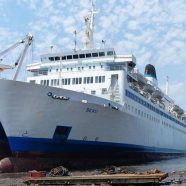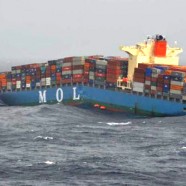Costa Concordia – Press Release #6
Press Release #6
Tomorrow, at any point during the hours-long raising of the wreckage, the cruise ship containing 50,000 tons of scrap, waste, and polluted water could split open like an old, cracked bathtub. While the Costa Concordia is now in a relatively confined area, tomorrow this dump could be spread out over the Island of Giglio, and the Mediterranean sea. The only reassuring thing is that the wreck has been drained of its propulsion fuel. For the past 19 months, the hull of the Costa Concordia has been subject to the corrosion caused by waves and offshore currents. Therefore, there is a pressing risk of pollutant dispersal.
Ship-breaking kills in Turkey
Despite rumors praising safety in the shipbreaking yards of Turkey, work conditions there are still bad. Two workers intoxicated in the machine rooms of the ex-Pacific Princess have just payed for those conditions with their lifes.
The ex-Love Boat from the television series of the same name was sold to a turkish demolition yard in april 2012 for the price of $260 per ton. The Pacific Princess was evaluated at 8.000 tons. The buyer took over a year to finish paying. The ex-Pacific Princess left the Genoa Harbor on July 27th 2013 towed by the Izmir Bull under the name Acif. It had arrived in Genoa in november 2008 for renovation and technical compliance, but such work was soon abandoned. Built in 1971, the ship holds large quantities of asbestos ans PCBs. Its last known owner is the Quail Cruises Ship Management based in Madrid.
Shipbreaking # 32
The 32nd bulletin of information and analysis on Ship-breaking is published (75 pages). It covers the month of May, June and July 2013. In 8 years, the ship-breaking bulletin has become a reference in this field across the globe. Information and photographs are sent to Robin des Bois by regular or occasional correspondents.
Over the last three months, 271 ships have been sent to demolition. They total over 2.2 million tonnes of metal. 106 (39%) were built in Europe, 88 (32%) belonged to European owners, 241 (89%) were sent to Asia.
India Burns Smuggled Ivory. And France?
Today, the state of Maharashtra will burn precious animal materials that have been seized by anti-poaching organizations. The leopard and tiger fur that was priced at about €12,000 a piece, along with the tusks of ivory that are sold on the black market from €1,500/kg for up to €5,500/kg, will be completely destroyed.
The state of Kerala is getting ready to do the same with their stock of 3 tons of ivory that has been seized over the past 20 years.
The Indian authorities will be taking advantage of the widespread presence of spectators to raise awareness, thereby doubling their efforts in the fight against environmental crime by enforcing both International regulations and Indian law for the protection of animals.












